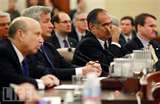
The Financial Crisis Inquiry Commission issued its final report Thursday, laying the blame for the 2008 crisis on “reckless” Wall Street CEOs and “pivotal failure(s)” by government regulators, who may have been unduly influenced by Wall Street lobbying efforts.
Via Tech Ticker
“This crisis was the result of human action and inaction, not of Mother Nature or computer models gone haywire,” the FCIC declared. “The captains of finance and the public stewards of our financial system ignored warnings and failed to question, understand, and manage evolving risks.”
The Commission’s findings are “too facile,” says former CBO director Douglas Holtz-Eakin, a FCIC commissioner and co-author of one of two separate dissents to the majority’s findings. “They basically blame everybody. And if it’s everybody’s fault it’s nobody’s fault.”
Rather than “Wall Street greed” or lobbying designed to make regulators look the other way, “a much more nuanced view is in order,” says Holtz-Eakin, currently president of the American Action Forum. “This was a global phenomenon…and happened in very different monetary policy regimes and regulatory regimes.”
While conceding AIG credit default swaps “featured prominently” in the crisis, Holtz-Eakin disputes the idea that derivatives were to blame, as some contend. He also disagrees that the primary cause was government housing policy and the related abuses by Fannie Mae and Freddie Mac, as a separate dissent by Peter J. Wallison claims.
In a WSJ op-ed, Holtz-Eakin, FCIC Vice Chair Bill Thomas and commissioner Keith Hennessey lay out the 10 Factors they argue really cased the financial crisis, including:
— Failures in credit rating and securitization.
— Enormous concentration of risk in highly correlated assets.
— Insufficient capital and over reliance on short-term funding.
— Large counterparty credit-risk exposure.
In other words, Holtz-Eakin in unsympathetic to the view that the crisis was caused by a “100-year flood” or a “run on the bank,” as suggested by some Wall Street executives, including Lehman Brothers’ Dick Fuld and Bear Stearns’ Alan Schwartz.
“Concentrating mortgage risks in the midst of a housing bubble leaves you highly exposed and that happened to particular firms,” he says. “The notion they had a run on themselves independent of their financial structure is just wrong. But in the panic we saw comparable runs on institutions that had no comparable exposure; it really was a panic.”
Yes, it really was. And given the size and scope of the panic it’s unlikely there will ever be unanimity of the cause of the 2008 crisis, as demonstrated by dissension in the ranks of the FCIC itself.
Aaron Task is the host of Tech Ticker. You can follow him on Twitter at @atask or email him at [email protected]
ATTENTION READERS
We See The World From All Sides and Want YOU To Be Fully InformedIn fact, intentional disinformation is a disgraceful scourge in media today. So to assuage any possible errant incorrect information posted herein, we strongly encourage you to seek corroboration from other non-VT sources before forming an educated opinion.
About VT - Policies & Disclosures - Comment Policy



